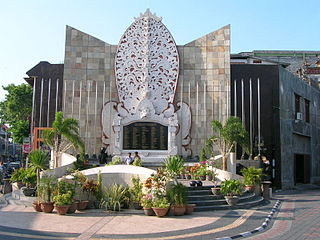Trafficking conspiracy
Media reports based on the testimony of co-conspirator, Renae Lawrence, claim that Nguyen (going by the alias of David), from Wellington Point in Brisbane, Queensland, had arranged an earlier attempt at trafficking from Indonesia to Australia. This attempt in December 2004 involved Lawrence, Andrew Chan, Matthew Norman and others. The delivery was aborted when heroin suppliers failed to deliver "due to a financial matter or someone knowing about the plan the shipment was cancelled". [8]
Further media reports, again based on court testimonies, claim that Nguyen met Michael Czugaj and Scott Rush (both Brisbane school friends) in a pub in Fortitude Valley [9] where Nguyen reportedly offered Rush and Czugaj an all-expenses-paid trip to Bali. [5] [6]
Arriving in Bali on or about 8 April 2005, Rush and Czugaj met co-ringleaders Myuran Sukumaran and Andrew Chan at the Hard Rock Hotel, [6] and also Renae Lawrence and Martin Stephens. On 14 April, Norman, Si Yi Chen, Lawrence and Stephens checked into Adhi Dharma hotel in Bali, with Nguyen arriving in the same hotel two days later. In the evening of Sunday 17 April, acting like tourists, Nguyen, Norman, and Chen checked into the Melasti Hotel. Myuran Sukumaran, who was also with them, with his bags, left them with the others as he decided to go to the Hard Rock Hotel complex. [10] [11]
All were later convicted of drug trafficking as fellow members of the Bali Nine. [12]
Arrest in Indonesia
Approximately 20 minutes after checking in, Nguyen was arrested at the Melasti Hotel in Kuta on 17 April 2005 with Matthew Norman, Myuran Sukumaran and Si Yi Chen. Indonesian police claim the group were in possession of 334 g (11.8 oz) of heroin and bundles of plastic wrapping, Elastoplast tape, and a set of scales, indicating involvement in a plan to transport drugs to Australia. [10]
Earlier that day at Ngurah Rai International Airport in Denpasar, Indonesian police also arrested the following drug mules after they were found carrying various amounts of heroin concealed on their bodies. Martin Stephens was found to be carrying 3.3 kg (7.3 lb); Renae Lawrence was found to be carrying 2.689 kg (5.93 lb); Michael Czugaj was found to be carrying 1.75 kg (3.9 lb) and Scott Rush was found to be carrying 1.3 kg (2.9 lb) of heroin. Co-ringleader Andrew Chan was also arrested the same day while seated on an Australian Airlines flight waiting to depart Denpasar for Sydney. At the time of his arrest, Chan was carrying three mobile phones and a boarding pass. No drugs were found in his possession. [11]
Criticism of Australian Federal Police tipoff
Lee Rush, the father of Scott Rush, a fellow member of the Bali Nine, said that he contacted the Australian Federal Police (AFP) prior to the commission of the offence, fearing his son was travelling to Bali and would commit a drug-related crime. Rush senior claims then to have received assurances from the AFP that they would tell his son he was under surveillance to dissuade him from going through with the crime before the group's departure from Indonesia. Scott Rush's lawyers said he was never contacted. It was revealed that the AFP alerted Indonesian police that a crime was to be committed approximately two weeks before the arrests, and had commenced an investigation about ten weeks prior to the arrests. [5] [13] [14]
When the Bali Nine were arrested, the news of the tipoff became public [15] and there was criticism of the role of the AFP in protecting the interests of Australian citizens. [14] Commenting on the matter at the time, AFP Commissioner Mick Keelty was reported as saying: [16]
"One of the things we've got to remember is that we operate within our criminal-justice system here in Australia, and if we only co-operated with countries that had the same criminal-justice system, then our co-operation wouldn't extend very far beyond Australia. We have to work with the systems that operate in other countries, and to a large degree this has been successful, certainly in terms of heroin trafficking."
Rush took action in the Federal Court of Australia against the AFP for breach of the bilateral treaty between Indonesia and Australia when information was handed by the AFP to the Indonesians. Rush's case claimed that such information should only be released by the Attorney-General. However, the Commonwealth Government maintained that the treaty only applies after a suspect is charged. [17] The application was dismissed by the Federal Court in January 2006.[ citation needed ]




